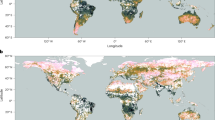Abstract
PLANTS grown in non-porous containers frequently show a lower concentration of roots on the periphery of the block of soil than similar plants grown in porous containers1, and there is sometimes a tendency for the direction of growth of these peripheral roots to be more nearly vertical in non-porous than in porous containers2,3. Gradients of water, nutrient or gas concentration, or of soil temperature, have been suggested as causes of these phenomena, but there is also the possibility that light has an effect, since many non-porous containers made of glass or plastics are transparent, whereas porous ‘clay’ pots are opaque.
This is a preview of subscription content, access via your institution
Access options
Subscribe to this journal
Receive 51 print issues and online access
$199.00 per year
only $3.90 per issue
Buy this article
- Purchase on Springer Link
- Instant access to full article PDF
Prices may be subject to local taxes which are calculated during checkout
Similar content being viewed by others
References
Bunt, A. C., Ann. Rep. Glasshouse Crops Res. Inst., 1959, 116 (1960).
Hunter, J. A., N.Z. J. Sci. Tech. Sec., A, 34, 365 (1952).
Breschke, K., Gartenwelt, 60 (3), 56 (1960).
Rawitscher, F., Bot. Rev., 3 (4), 175 (1937).
Author information
Authors and Affiliations
Rights and permissions
About this article
Cite this article
LAKE, J., SLACK, G. Dependence on Light of Geotropism in Plant Roots. Nature 191, 300–302 (1961). https://doi.org/10.1038/191300a0
Issue Date:
DOI: https://doi.org/10.1038/191300a0
This article is cited by
-
Root system architecture and gravity perception of a mangrove plant,Sonneratia alba J. Smith
Journal of Plant Biology (2004)
-
Comparison of growth, exogenous auxin sensitivity, and endogenous indole-3-acetic acid content in roots ofHordeum vulgare L. and an agravitropic mutant
Biochemical Genetics (1986)
-
The positive hook: the role of gravity in the formation and opening of the apical hook
Planta (1983)
-
Kinetics of the light-induced georeactivity of maize roots
Planta (1979)
-
Gravity counteracts light-induced inhibition of root growth
Nature (1976)
Comments
By submitting a comment you agree to abide by our Terms and Community Guidelines. If you find something abusive or that does not comply with our terms or guidelines please flag it as inappropriate.



